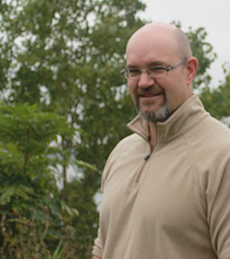Farming in an urban setting
Finding green spaces in the city can be difficult. It can be even harder to find farm-fresh, organic vegetables that haven’t travelled great distances, using fossil fuel to get to their destination.
The City Farm School is hoping to make local, organic produce more accessible to the Concordia and Montreal communities.
What began in 2011 as a five-day urban agriculture training course is now an eight- month, student-run training program that takes place at both the Loyola City Farm and the Concordia greenhouse on the Sir George Williams Campus.

“It starts in March in the greenhouse, starting seedlings,” says Marcus Lobb, City Farm School co-coordinator. “It’s voluntary, so it’s not for credit. It’s really just self-directed. There are 34 students in total and they end up doing internships and also are obligated to do seven hours of internship work in gardens within the city.”
Once students have enrolled in the City Farm School, they can choose between three streams of urban agriculture that interest them the most. Students can study market gardening, medicinal herbs, or work as student gardeners with the English Montreal School Board.
The City Farm School emphasizes community outreach, setting up partnerships with such local organizations as the NDG Food Depot, to which they have been donating fresh produce for the past two years. Students also organize free workshops and speaking events to teach people about urban agriculture, and sell organic vegetables from a market stand on the Loyola Campus.

“For the most part, we’re taught as children that farms are these things out in the country with cows and so on, and here is one in an urban setting,” says Peter Stoett, a Concordia professor and director of the Loyola Sustainability Research Centre. “Many of us as professors are interested in what’s going on there as this sort of live experiment in community organization and in urban agriculture. I teach political science and I see it as a sort of micro governance challenge - how do you make this thing run effectively? They’ve done a great job all these years.”
The Concordia greenhouse recently received approval for a fee levy. “Now is when I think we’re going to be able to do a lot more work and affect students a lot more,” Lobb says. “We’re really interested in the possibility of growing food closer to where people are. For us, it’s about really just trying to raise awareness for students about where food comes from, about how food systems are structured. It’s also trying to green the campus and convert lawns into productive spaces, which, in a lot of ways, for a student, is a healthier environment. We’re making affordable, organic, locally grown produce available for students.
“The school itself is a program that allows people to have an experience-based learning environment in which they work directly with youth or with the community, and there’s not a lot of other programs that do that.”
Read related Earth Day articles.
Related links:
• Concordia City Farm
• Concordia greenhouse
• Loyola Sustainability Research Centre